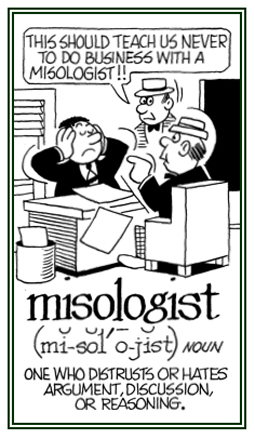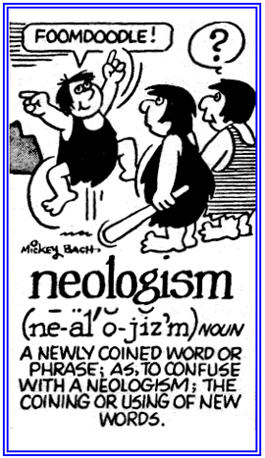logo-, log-, -logia, -logic, -logical, -logism, -logician, -logian, -logue
(Greek: talk, speak; speech; word; a person who speaks in a certain manner; someone who deals with topics or subjects)
Words that utilize -ology are in a separate unit. All -ology words can be made into -ologistic forms.
2. In Judaism, the divine wisdom of the Word of God.
2. Spasmodic word enunciation.
Sometimes used as an equivalent of logoclonia which is the spasmodic repetition of words or parts of words, particularly the end syllables, often occurring in Alzheimer's disease.
2. An existential type of psychotherapy which maintains that man's mental health depends on his/her awareness of meaning in her/his life.
3. A treatment modality based on the application of humanistic and existential psychology to assist a patient in finding meaning and purpose in life and unique life experiences.
2. An aversion or hatred of talking or of mental activity: Working on this dictionary requires a lot of intellectual thinking and creative writing; nothing for those who would rather spend most of their time with passive activities like watching TV, DVDs or existing with a condition of misologia!
Is it possible that there are husbands and wives who divorced each other because they were misologists?
A misologist can also be a person of action who prefers to plunge ahead to accomplish something instead of talking about it so much.
2. A hater of over reasoning or critical comments: As a young pre-teenager, Larry became a misologist because he never wanted to listen to his parents trying to explain why he was not allowed to do the same things as grown-ups, like staying up late or watching crime movies on TV.
Go to this Word A Day Revisited Index
so you can see more of Mickey Bach's cartoons.
The construction of the new play was interesting in that it created a unique balance between each monologue every brilliant dialogue.
2. The practice of coining new words or phrases, or of extending the meaning of existing words or phrases: Tom was very interested in neologism and was fascinated by the way previously used terms were formed into brand-new ways of expression!
3. In medicine and psychiatry, an existing word can be used in a new sense or a new word or phrase of the patient's own making can be created, often seen in schizophrenia: In psychiatry, such usages of neologisms may have meaning only to the sufferer or be indicative of his or her condition. 4. The use of an unconventional vocabulary innovation; when the use of such a coinage or innovation is either rationally, to represent a new idea, method, or object; or as with a disordered neurological condition or as with a mental disorder when the patient wishes to express a highly complex meaning related to his or her conflicts: In her state of delirium, Sandra was known to create neologisms and invent new terms nobody had ever heard of before!
5. Etymology: "practice of innovation in language", 1800, from French néologisme, from Greek neo-, "new" + Greek logos, "word".

Go to this Word A Day Revisited Index
so you can see more of Mickey Bach's cartoons.
Neologoliferation is a combination of neo, "new"; logo, "word"; and proliferation, "rapid and often excessive spread or increase".
2. Perverted logic or reasoning in speaking in which the idea that is next in the chain of thought is suppressed and replaced by another that is related to it.
![]() You may take a self-scoring quiz over some of the words in this section by just clicking on Logo Quiz to check your word knowledge.
You may take a self-scoring quiz over some of the words in this section by just clicking on Logo Quiz to check your word knowledge.
Cross references of word families related directly, or indirectly, to: "talk, speak, speech; words, language; tongue, etc.": cit-; clam-; dic-; fa-; -farious; glosso-; glotto-; lalo-; linguo-; locu-; loqu-; mythico-; -ology; ora-; -phasia; -phemia; phon-; phras-; Quotes: Language,Part 1; Quotes: Language, Part 2; Quotes: Language, Part 3; serm-; tongue; voc-.
Related "word, words" units: etym-; legi-; lexico-; locu-; onomato-; -onym; verbo-.


